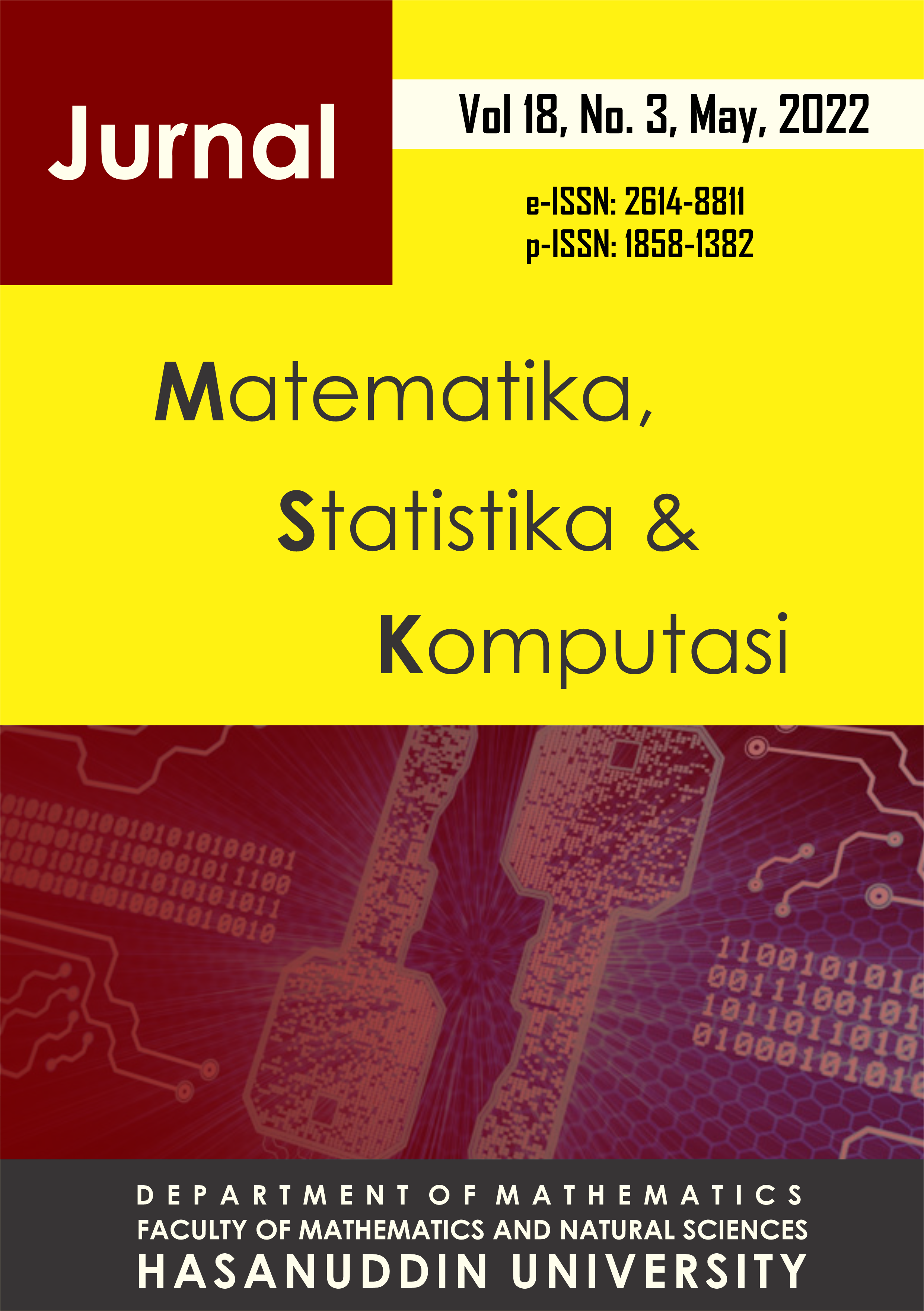Misclassification Analysis of Elementary School Accreditation Data in Ambon City Using Multivariate Adaptive Regression Spline
DOI:
https://doi.org/10.20956/j.v18i3.19451Keywords:
Missclassification, Accreditation, GCV, MARS, APERAbstract
Many classification methods have been developed, one of which is the Multivariate Adaptive Regression Spline (MARS) method. MARS is one of the classification methods in the form of a combination of Recursive Partitioning Regression (RPR) and the spline method that is able to process high-dimensional and large-sized data and process data with continuous or binary response variables. The purpose of this study was to measure the misclassification of elementary school accreditation in Ambon city using the MARS method. This study uses accreditation data with the results of eight components of accreditation in elementary schools that have accreditation A (group 1) and accreditation B (group 2) in Ambon city. To evaluate the classification method used the APER classification error measure. The best classification result from the MARS method is when using a combination of BF=32, MI=3, MO=1 because it produces a minimum Generalized Cross Validation (GCV) of 0.066 and information is obtained that the correct classification data is 181 and the misclassified data is 10. Based on the results of the analysis, the size of the APER classification error is 5.23%, which can be said that the MARS method is good or statistically significant for classifying elementary schools in Ambon City based on their accreditation rating.
References
Celik S. & Yilmaz O., 2018. Prediction of Body Weight of Turkish Tazi Dogs using Data Mining Techniques: Classification and Regression Tree (CART) and Multivariate Adaptive Regression Splines (MARS). Pakistan J. Zooloogy, Vol. 50, 575-583.
Depdiknas., 2003. Undang-Undang RI No.20 Tahun 2003 Tentang Sistem Pendidikan Nasional.
Depren S.K., 2018. Prediction of Students’ Science Achievement: An Application of Multivariate Adaptive Regression Splines and Regression Trees. Journal of Baltic Science Education, Vol. 17, No. 5, 887-903.
Ferreira L.G., Duarte A. B., da Cunha F.F. & Filho I. F., 2019. Multivariate Adaptive Regression Splines (MARS) Applied to Daily Reference Evapotranspiration Modeling With Limited Weather Data. Acta Scientarium Agronomy, Vol. 41, No. 1, 1-11
Friedman J.H., 1991. Multivariate Adaptive Regression Spline (With Discussion). The Annals of Statistics, Vol. 19, No.1, 1-141.
Johnson R.A. & Wichern D.W., 1992. Applied Multivariate Statistical Analysis. Prentice Hall, New Jersey.
Lembang F.K., Patty H.W.M. & Maitimu F., 2019. Analisis Kemiskinan di Kabupaten Maluku Tenggara Barat Menggunakan Pendekatan Multivariate Adaptive Regression Spline (MARS). Media Statistika, Vol.12, No. 2, 188-199.
Misya M.V.S., 2017. Upaya Pemerintah Daerah Dalam Meningkatkan Pendidikan Di Komunitas Adat Terpencil Desa Sesap Kecamatan Tebing Tinggi Kabupaten Kepulauan Meranti Tahun 2011-2014. Jurnal Online Mahasiswa, Vol. 4, No. 1, 1-13.
Peraturan Pemerintah Nomor 19 Tahun 2005 Tentang Standar Nasional Pendidikan
Radjab R., 2020. Analisis Klasifikasi Menggunakan Metode K-Nearest Neighbor (K-NN) Pada Data Akreditasi SD/MI Di Kota Ambon. Skripsi. Jurusan Matematika. Fakultas Matematika dan Ilmu Pengetahuan Alam, Universitas Pattimura, Ambon.
Rotigliano E., Martinello C., Agnesi V. & Conoscenti C., 2018. Evaluation of Debris Flow Susceptibility in El Salvador (CA): A Comparison Between Multivariate Adaptive Regression Splines (MARS) and Binary Logistic Regression (BLR). Hungarian Geographical Bulletin, Vol. 67, No. 4, 361-373.
Downloads
Published
How to Cite
Issue
Section
License
Copyright (c) 2022 Author and publisher

This work is licensed under a Creative Commons Attribution 4.0 International License.

This work is licensed under a Creative Commons Attribution 4.0 International License.
Jurnal Matematika, Statistika dan Komputasi is an Open Access journal, all articles are distributed under the terms of the Creative Commons Attribution License, allowing third parties to copy and redistribute the material in any medium or format, transform, and build upon the material, provided the original work is properly cited and states its license. This license allows authors and readers to use all articles, data sets, graphics and appendices in data mining applications, search engines, web sites, blogs and other platforms by providing appropriate reference.







